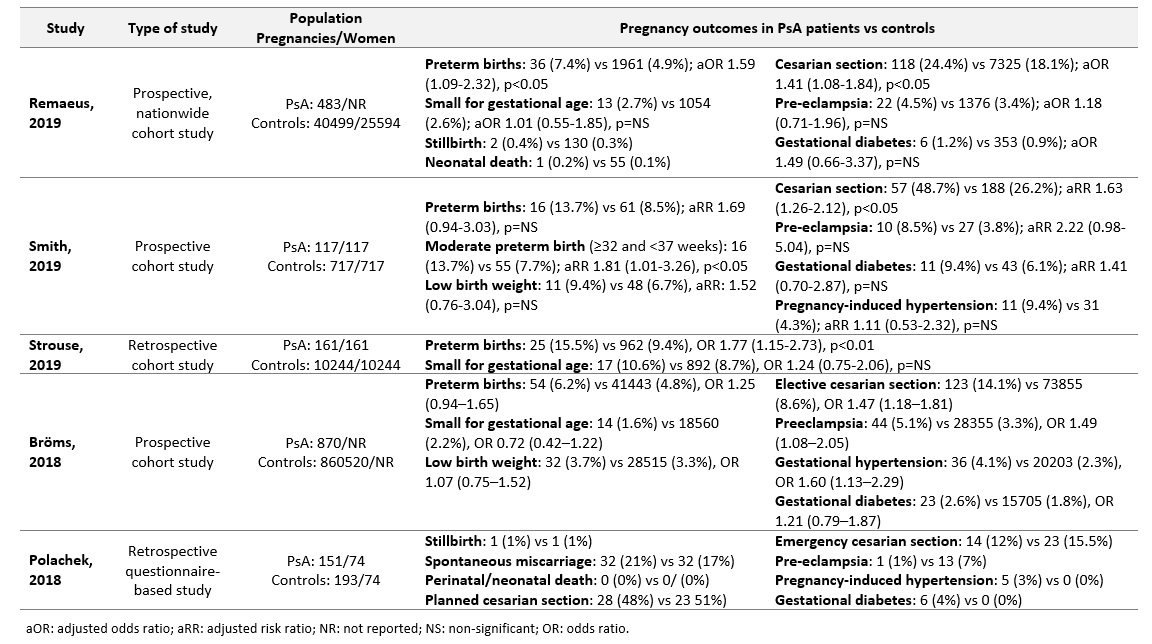Session Information
Session Type: Poster Session D
Session Time: 9:00AM-11:00AM
Background/Purpose: The onset of psoriatic arthritis (PsA) often occurs between the ages of 30 and 50 years. Accordingly, many female patients are diagnosed during childbearing age, potentially impacting their pregnancy outcomes. However, there is a paucity of data concerning the fetal and maternal outcomes in this population and most of the information is extrapolated from studies on rheumatoid arthritis (RA). We aim to review the available evidence on the relationship between PsA and adverse pregnancy outcomes.
Methods: We systematically searched two databases, PubMed and Embase, for original studies from inception of the databases until May 31, 2020, addressing fetal and maternal outcomes in pregnant women with PsA. A variety of terms adjusted to the specificities of the two databases and related to key subject areas of the review question were used. The search was filtered to only include human participants and publications in English. The eligible studies had to present a comparator group (healthy individuals or patients without known auto-immune rheumatic diseases – ARD’s), as well as at least one clinical outcome of interest. Studies including patients with other ARD’s were eligible only if results from patients with PsA were presented separately. Two authors independently selected studies and extracted data.
Results: Of a total of 708 references, 5 observational studies fulfilled the inclusion criteria: 3 prospective and 2 retrospective studies (table 1).
Concerning maternal outcomes, the odds of delivery by caesarian section was higher among PsA women compared with the control groups, in 3 out of 4 studies. However, the majority of studies did not find an increased risk of pre-eclampsia or gestational hypertension among PsA patients. Likewise, no study has found an increased risk of gestational diabetes in pregnant women with PsA.
Regarding fetal outcomes, 3 studies revealed an increased risk of preterm birth in PsA patients, out of 4 studies reporting this outcome. Spontaneous miscarriages, stillbirths, neonatal deaths and small for gestational age newborns occurred at similar rates in women with PsA and the comparator groups, across the different studies.
Only one of the included studies, has assessed the influence of disease activity in the outcomes. Smith et al observed that active disease (defined as RAPID3 score ≥ 7 and HAQ >0.5) at 32 weeks of gestation increased the risk for preterm birth in PsA.
Conclusion: Despite the limited available data, these studies suggest an increased risk for delivery by caesarian section and preterm births among pregnant women with PsA. Increased disease activity seems to contribute to a higher risk of preterm birth as in RA. Nonetheless, this effect should be further examined.
 Maternal and fetal outcomes in PsA patients.
Maternal and fetal outcomes in PsA patients.
To cite this abstract in AMA style:
Neto A, Pinheiro Torres R, Donato H, Mourão A, Branco J, Pimentel-Santos F. Maternal and Fetal Outcomes in Pregnant Women with Psoriatic Arthritis: A Systematic Literature Review [abstract]. Arthritis Rheumatol. 2020; 72 (suppl 10). https://acrabstracts.org/abstract/maternal-and-fetal-outcomes-in-pregnant-women-with-psoriatic-arthritis-a-systematic-literature-review/. Accessed .« Back to ACR Convergence 2020
ACR Meeting Abstracts - https://acrabstracts.org/abstract/maternal-and-fetal-outcomes-in-pregnant-women-with-psoriatic-arthritis-a-systematic-literature-review/
